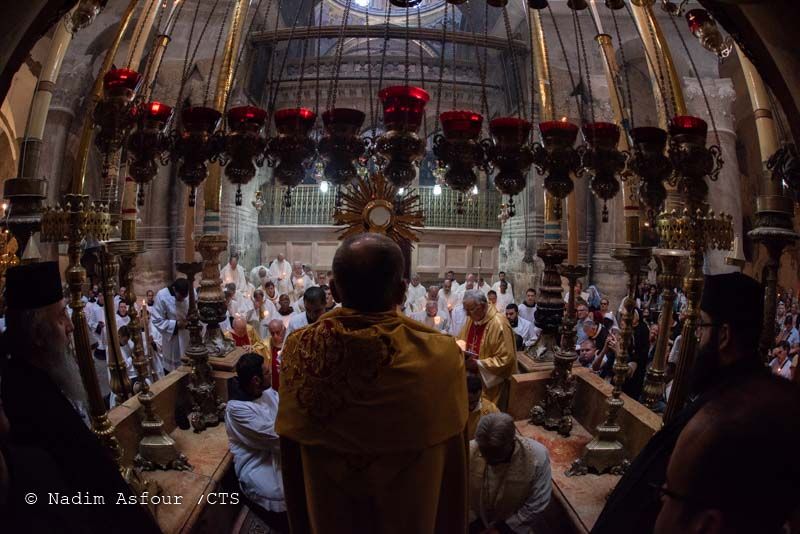Solemnity of Corpus Christi
The Cenacle, Jerusalem, 23rd June, 2019
Gen 14.18-20, Ps 109; 1Cor 11.23-26; Lk 9.11-17
Dear brothers and sisters,
May the Lord give you peace!
1. Sitting at table is much more than the mere satisfaction of a physiological need. It is sitting at table that means to some extent that we recognize we are part of creation. It means recognizing that we do not give life to ourselves but we receive it as a gift. It means recognizing ourselves in communion with creation and needing the Creator to open His hands and satisfy us like every other living being. Perhaps this is why in every culture and in every religion eating together is charged with meanings that start from the reality of nourishment but at the same time transcend it, surpass it.
2. Within this reality of creatural dependence, the same Son of God was placed, when He chose the path of the Incarnation to become our brother. Incarnating Himself, however, He brought this reality of creation into a new dimension: that of divine life. At the Last Supper, as we read in the First letter to the Corinthians, which is the oldest account we have on the institution of the Eucharist, Jesus assumes creation in the form of bread and wine, He assumes a cultural and religious tradition belonging to the people of Israel. He reenacts the gesture of the ancient and mysterious high priest, Melchizedek. It is in this gesture of offering, in this tradition of breaking bread and sharing wine, that these natural and creatural elements that are bread and wine are filled with the gift of Himself.
3. Sitting at table becomes sitting at table with God, receiving the bread and wine transformed by the Word of Christ and by the power of the Spirit, it means assuming divine life itself in the way in which Christ assumed human life in the Incarnation : “This is my body, which is given up for you. This cup is the New Covenant of my blood “. In receiving the Eucharist, the natural element therefore assumes a supernatural meaning: we feed on God and God becomes our life, we sit at table with God and experience communion at the highest level, a communion that unites us to Him and a communion that unites us in Him.
4. That eating and drinking take on this meaning, the apostle Paul always reminds us, it is not a magical or purely ritual fact. The Eucharist is a reality that has to do with a Tradition that is along an unbroken chain of people who transmit what they have received from the Lord. The Eucharist is an action of the Church, it is among the fundamental gifts that the Church has received from Christ. At the same time the Eucharist is a “memorial”: Christ placed Himself “in the hands of the Church” in order to be still active and active in our favour, within history, ensuring that the Paschal mystery is contemporary and salvific for every man and every woman who comes into this world.
5. In the encyclical “Laudato sii” on the care for the common home is Creation itself, Pope Francis dedicated a very beautiful and illuminating paragraph precisely on the theme of the Eucharist. Allow me to quote it to you on this occasion: “It is in the Eucharist that all that has been created finds its greatest exaltation. Grace, which tends to manifest itself tangibly, found unsurpassable expression when God himself became man and gave himself as food for his creatures. The Lord, in the culmination of the mystery of the Incarnation, chose to reach our intimate depths through a fragment of matter. He comes not from above, but from within, He comes that we might find Him in this world of ours. In the Eucharist, fullness is already achieved; it is the living centre of the universe, the overflowing core of love and of inexhaustible life. Joined to the incarnate Son, present in the Eucharist, the whole cosmos gives thanks to God. Indeed the Eucharist is itself an act of cosmic love: “Yes, cosmic! Because even when it is celebrated on the humble altar of a country church, the Eucharist is always in some way celebrated on the altar of the world”. The Eucharist joins heaven and earth; it embraces and penetrates all creation. The world which came forth from God’s hands returns to him in blessed and undivided adoration: in the bread of the Eucharist, “creation is projected towards divinization, towards the holy wedding feast, towards unification with the Creator Himself”. Thus, the Eucharist is also a source of light and motivation for our concerns for the environment, directing us to be stewards of all creation” (LS 236).

6. Starting from this perspective it is good that we ask ourselves about our Eucharistic celebrations, our participation in the Eucharist, our ability to adore the Divine Mystery present in the Eucharist. But starting from this perspective it is good that we also ask ourselves about our relationship with life, with the world, with creation and with all creatures, which in the Eucharist begin to experience the deification movement that began with the Easter event the Paschal mystery of Jesus Christ?
7. With the astonishment expressed by our Seraphic Father St. Francis we may also exclaim: “O admirable height and stupendous condescension! O sublime humility! O humble sublimity, that the Lord of the universe, God and the Son of God, humbles Himself to the point of hiding Himself, for our salvation, under the appearance of bread! “(LOrd 27: FF 221). And we remember that “He fills those present and absent who are worthy of Him” (LOrd 32: 223).
Fr. Francis Patton, OFM
Custos of the Holy Land

